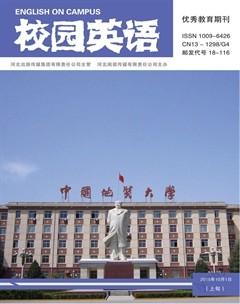On Employment of Defamiliarization in Young Goodman Brown from Words of Estrangement
2015-05-30李莎
李莎
【Abstract】Defamiliarization referred as the instrument to prolong the aesthetic process of literary work can be realized by the words of estrangement.This paper thus focuses on the discussion of the wording of Young Goodman Brown to reveal how defamiliarization contributes to great aesthetic impact on the readers words of estrangement.
【Key words】Defamiliarization; Words of Estrangement; Modal verbs
1.Introduction
As one of the most influential American writer,Nathaniel Hawthorne's talent and insights have been demonstrated in his earlier work Young Goodman Brown.In this short story,Hawthorn tries to convey his meditation about human nature whereby to arouse sympathy of the readers.Defamiliarization is essential in the process through the device of estrangement at linguistic level.This paper will first lay the theoretical foundation by briefly interpreting what defamiliarization is,and then analyzes the application of how defamiliarization is employed by the words of employment in this short story.
2.Brief Interpretation of Defamiliarization
Proposed by the master of formalism Victor Shklovsky,defamiliarization has developed as the core idea of formalism.In his paper,Art as Technique,Shklovsky points out that The technique of art is to make objects “unfamiliar”,to make forms difficult,to increase the difficulty and length of perception because the process of perception is an aesthetic end in itself and must be prolonged.He distinguishes poetic language and practical language used everyday because the former should be more difficult than the latter to understand.The reason accounting for the difficulty should attribute to the employment of defamiliarization.In our routines of everyday speech,our perception of and response to reality become stale,blunted,or,as the Formalists would say,“automatized”(Terry Eagleton 2004:9).By means of unusual and novel ways to estrange those routines,defamiliarization in literature,however,dramatically challenges what may be taken for granted in daily life.When their preoccupation and stereotype being overturned,and the understanding being impeded,readers will pay close attention to the text,trying to work out the meaning with great interest.
As in Young Goodman Brown,he author uses a number of words of estrangement,especially modal verbs,to depict setting and mentality of the characters in a distance,creating mystery and uncertainty.
3.Words of Estrangement in the Story
Words of estrangement deals with effects of defamiliarization by the means of wording.Words of estrangement could be divided into three categories:speculative verbs,adjectives and adverbs,clauses with speculative verbs,adjectives and adverbs,and modal verbs.This paper will specifically discuss the use of modal verbs to convey sense of unfamiliarity.
The paragraph that describes Brown's old companion from an external perspective employs lots of modal verb.These words of estrangement creates a distance and gap between the observer and the character being described,and thus the character may have an air of mystery.A step further,the technique of estrangement leads to alienation:the character is incomprehensible,unreachable,scarcely a member of the human race(Roger Fowler 1983:95).The use of words of estrangement here is dealt from three aspects:the description of the old man's appearance,the speculation about his social status and the depiction of his staff.
When describing the appearance,the author uses “might have been taken for father and son” to indicate that he deliberately keeps a distance with the old man.Maybe he is too afraid of the old man to get a close look of him.By now,the author has not reveal the old man's identity,but the readers could already sense mystery and wickedness of the old man.
When it comes to the social status of the old man,the author says “who would not have felt abashed at the governor's dinner table or in King William's court”.This is the speculation of the author about how powerful he is.From the air of the old man,the observer make an inference that he was so sophisticated and powerful that even having dinner with the people of highest rank will not embarrass him at all.
The author attaches great attention to the depiction of the old man's staff.Because of distance and the uncertain light,the observer only has an vague picture that it is “so curiously wrought that it might almost be seen to twist and wriggle itself like a living serpent”.Since the uncertainty of the observer marked by“might”,it leaves more space for the readers to speculate whether the staff is deliberately carved as a serpent and how does it relate to the identity of the old man.If it is,the staff is no doubt the symbol of the old man's wickedness; if it is not,why he held such an evil staff.The words of estrangement from these three aspects altogether enhance the mystery and inhumanity of the old man.His wickedness and his power would bring fatal impact on almost everyone.So Brown is destined to be led to the devil's fair and spend the rest of his life in depression and despair.
4.Conclusion
What can be concluded from the discussion above is that the success of Young Goodman Brown largely lies partly in Hawthorn's employment of defamiliarization which involves the readers in the story by holding their attention and leaving more space for them to meditate.In consequence,the readers would naturally and unconsciously accept the ideas the author is meant to express whereby to accomplish the author's objectives as well as to achieve artistic aesthetic.
References:
[1]Roger.Fowler.Linguistic and.Novel.London.and Newyork:Methuen Publishers.1983.
[2]TerryEagleton.LiteraryThoery:An Introduction, Shanghai:Foreign Language Teaching and Research Press.2004.
[3]Victor Shklovsky,Art as Technique.
